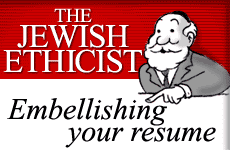 Iran’s Attack on Israel
Iran’s Attack on Israel


3 min read
4 min read
11 min read
3 min read
Is it okay to stretch the truth a bit to increase your chances of getting a job interview?
The Jewish Ethicist is a joint project with the JCT Center for Business Ethics.
Q. I'm looking for a job in web development. My friends advise me to stretch the truth a bit on my resume so as to increase my chances of getting an interview. How far can I go in embellishing my credentials? How can I "sell myself" without being an egotist? MK, US
A. When selling yourself or your product you may – and should – put your best foot forward; but you can't mislead the other side. Jewish tradition distinguishes among three kinds of exaggeration:
If you have firm evidence that the employer is unfairly biased against you, you may subtly camouflage your status. For instance, if Patricia Smith knows the employer discriminates against women, she can write her name Pat Smith. Don't do this if the bias is justifiable – for instance, a store wants a man to sell men's clothes because this makes the customer more comfortable.
Outright lying can never be justified.
Don't be overly concerned about egotism. Giving a good impression is not only for your own interest; the employer also wants to see you at your best. I'm sure that even if you're usually a little shlumpy, you neaten up when you go out to show your date (or spouse) you care; by the same token, putting your best foot forward on your resume is a way of showing respect and esteem for the firm.
SOURCES: Shulchan Aruch, Choshen Mishpat chapter 228; Talmud Chullin page 94b, Yevamot 45a; Igrot Moshe YD II:61. A detailed analysis can be found in section 2 of Case Studies in Jewish Business Ethics by Rabbi Aaron Levine.
Send your queries about ethics in the workplace to jewishethicist@aish.com
The Jewish Ethicist presents some general principles of Jewish law. For specific questions and direct application, please consult a qualified Rabbi.
The Jewish Ethicist is a joint project of Aish.com and the Center for Business Ethics, Jerusalem College of Technology. To find out more about business ethics and Jewish values for the workplace, visit the JCT Center for Business Ethics website at www.besr.org.
Copyright © JCT Center for Business Ethics.
